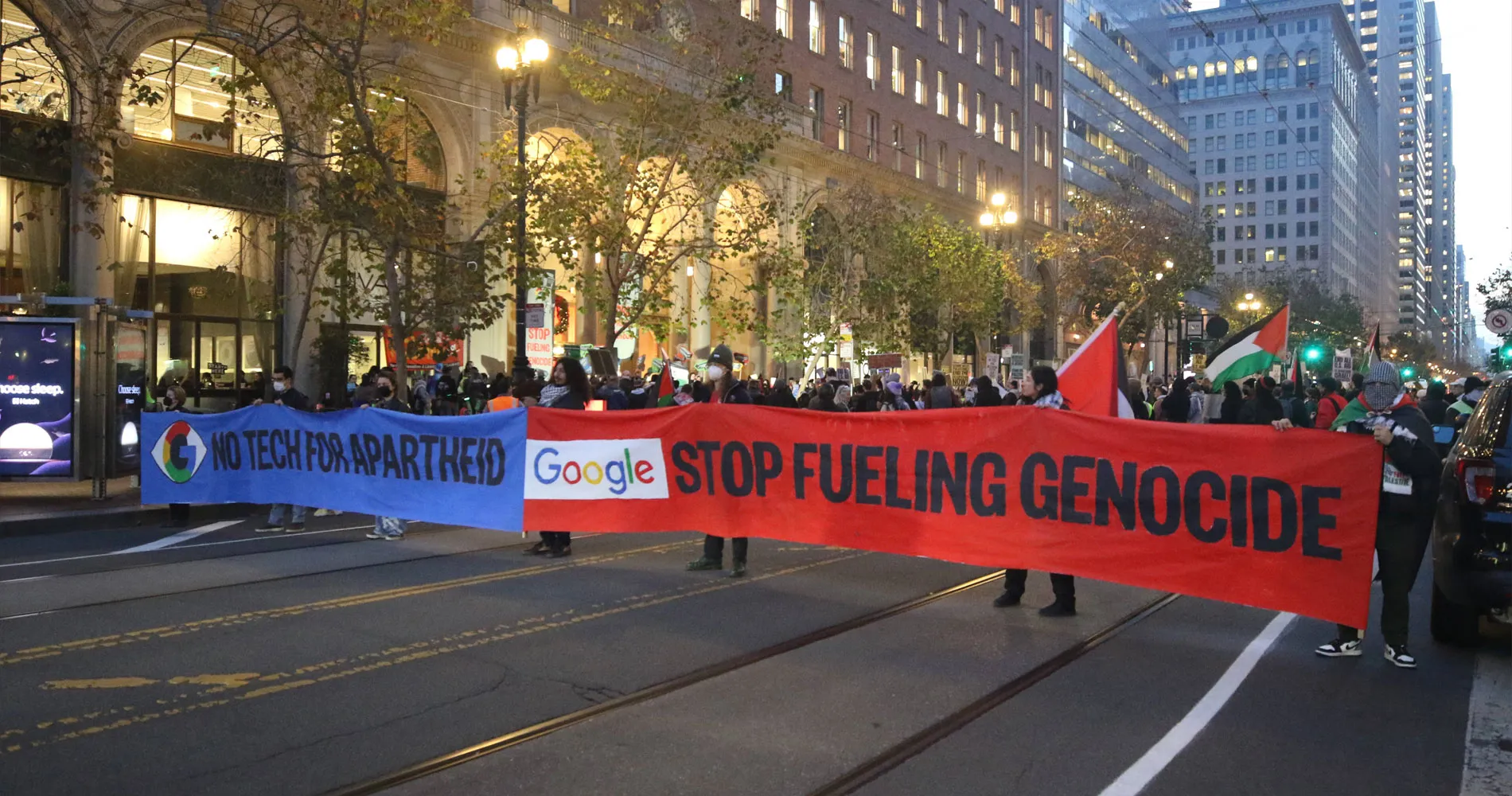Amazon shareholders put forward a motion to commission an independent investigation of the company’s ties to the Israeli military amid allegations of Amazon products being involved in human rights abuses. The motion is a reaction to the backlash and concern over corporate ties to the IDF and Israeli government.
Reed McIntire
22 July 2024
Arabic version | Chinese version | German version | Russian version
At the annual Amazon shareholders meeting on 22 May 2024, members brought forward a motion to implement a third-party investigation over alleged use of Amazon Web Services’ (AWS) products in the Israeli apartheid and human rights abuses against Palestinians.
The motion was brought forward by Investor Advocates for Social Justice, as part of an effort to address customer due diligence and increase transparency of Amazon’s connections and use of Amazon products by various governmental and law-enforcement agencies around the world.
Alongside Israel, AWS products and services have also been used by the US Department of Homeland Security to assemble biometric data later used for identifying targets for Immigration and Customs Enforcement, and by Chinese firms Dahua and Hikvision who have been blacklisted by the US government over alleged ties to the repression of the Uyghur ethnic minority in Western China.
The results of the motion are not yet available, but the Amazon board of trustees did advise shareholders to vote against it, saying it relies on “speculative and outdated concerns and mischaracterization” while also ignoring Amazon’s efforts to “mitigate the risk of misuse through policy and advocacy efforts” as per their Proxy Statement.
This proposal comes amid a wave of anti-corporate backlash by pro-Palestinian activists who have also protested Google’s ties to the Israeli government and military.
In April 2024, Seattle employees of Google and Amazon protested their respective companies’ contracts with the Israeli government, especially regarding a USD1.2 billion deal related to Israel’s Project Nimbus.
Project Nimbus is an ambitious expansion of the Israeli military’s cloud computing and AI capabilities, ultimately seeking to improve facial recognition of Palestinian targets as well as assist in drone and missile coordination. While the program would use Amazon and Google technology, the servers would likely be physically inside Israel, meaning they would remain subject only to Israeli law.
However, the likelihood of this technology remaining only in Israel is uncertain, considering the country’s track record of furnishing surveillance and security software to numerous regimes worldwide. For instance, in 2023 the Brazilian state intelligence service was under investigation over its use of Pegasus, an Israeli-produced spyware program, to conduct surveillance and espionage on critics and enemies of the Bolsonaro regime. Pegasus was also heavily utilized in the Mexican government’s hunt for notorious cartel leader El Chapo. Other notable targets of Pegasus reportedly include French President Emmanuel Macron and, ironically, Amazon CEO Jeff Bezos.
Also in April 2024, 50 protestors gathered outside of Google’s Seattle campus and demanded the company divest from the Israeli military. The protest was organized by No Tech For Apartheid, which in turn is composed of other protest groups such as Jewish Voice for Peace. Parallel protests at Google and Amazon’s other offices in New York and California occurred simultaneously with the protest in Seattle. In retaliation to the protests, Google fired over 50 employees from the involved divisions.
The highly mediatized campus protests in the United States have routinely targeted university and corporate ties to the Israeli military and government but have yet to cause any changes in Amazon’s or Google’s investments.
In the past two years, there has been a noticeable increase in socially conscious shareholder activity across the corporate world. In 2023 alone, 23 proposals concerning conflict areas and human rights abuses were brought by shareholders of Fortune 500 companies, 22%of which related specifically to Israel.
As with the Amazon proposal, the shareholders from Google/Alphabet, Lockheed Martin, Caterpillar, and General Dynamics asked for a separate independent investigation to determine to what extent their products were used to facilitate Israeli apartheid and slaughter of Palestinians.
These motions have thus far not been passed but remain an annual topic at these corporations’ shareholders meetings.
Alongside this wave of socially conscious stakeholders, there has also been an increase in defense investments by environmental, social, and governance (ESG) funds. ESG funds are stock and investment portfolios which typically focus on a plethora of popular issues, such as environmentalism or diversity. Interestingly, when it comes to defense, many ESG investors have put profits over principles. Since 2022, the amount of US-based ESG funds with investments in aerospace or defense rose from 35 to 36%. Meanwhile in Europe, the growth is more dramatic, with an increase from 25 to 29%.
Additionally, in 2023 there was the first global outflow of ESG investments, totaling around USD2.5 billion. The decline has little to do with the backlash against corporate investment in defense, especially relating to Israel. Instead, experts attribute this decrease to political concerns and questions over financial soundness.
At the moment it remains uncertain whether Amazon will pass the resolution in question. But it is increasingly clear that despite over 38000 Palestinian casualties, the main concerns of the shareholders are purely financial. Profits trumps principles yet again.







